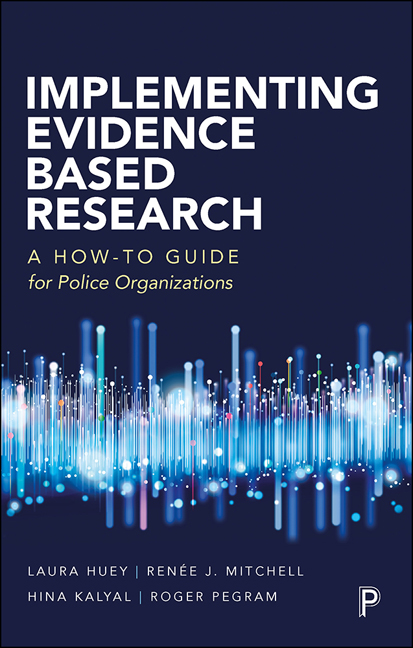Book contents
- Frontmatter
- Contents
- List of tables and figures
- Acknowledgments
- Introduction
- 1 Implementing evidence-based policing
- 2 Situating evidence-based policing
- 3 Understanding research
- 4 The individual approach
- 5 The smaller agency
- 6 The mid-sized agency
- 7 The larger agency
- 8 Generating sustainability
- 9 Resources for evidence-based practices
- Endnotes
- References
- Index
8 - Generating sustainability
Published online by Cambridge University Press: 05 January 2022
- Frontmatter
- Contents
- List of tables and figures
- Acknowledgments
- Introduction
- 1 Implementing evidence-based policing
- 2 Situating evidence-based policing
- 3 Understanding research
- 4 The individual approach
- 5 The smaller agency
- 6 The mid-sized agency
- 7 The larger agency
- 8 Generating sustainability
- 9 Resources for evidence-based practices
- Endnotes
- References
- Index
Summary
As we’ve observed with numerous policing initiatives over the years, programs can quickly become derailed as a result of a lack of forethought to the issue of long-term sustainability (Willis et al, 2007; Bradley and Nixon, 2009; Kalyal et al, 2018). Of all the topics we cover in this book, this is likely the one that is easiest to describe in theory but that will generate the most difficulty in practice. The reason for this is simple: the adoption of evidence-based policing (EBP) requires not only a degree of investment in individuals as change agents, but also, for some agencies, what might appear to be a radical rethinking of how police services engage in decision-making. While we recognize that the exigencies of policing can sometimes be best met by the traditional command and control structure, an evidencebased organization is one that embodies a learning culture – that is, an institutional culture that places emphasis on seeing operational and administrative decisions as opportunities for implementing innovation and learning lessons from both success and failure. It is also one that requires a more decentralized approach to viewing expertise and soliciting input and feedback into decision-making. In this chapter, we draw on the relevant management and other literatures, as well as on our own and others’ experiences, to make some specific and some broader recommendations for how to generate a sustainable EBP approach within small organizations.
Practical solutions
Investing in internal resources
A study was recently published showing that police officers experience increased job satisfaction when engaged in problemsolving activities within their communities (Sytsma and Piza, 2018). This should hardly be surprising. When organizations hire intelligent, thoughtful, analytical people with diverse knowledge and skills, those same people want to do work that is both intellectually and emotionally satisfying. Or, as one of us recently posted, ‘let smart people do smart work.’
The reality, however, can be very different. Another study, this one on crime analysts, revealed that very few of those surveyed were involved in program evaluation or other forms of experimentation (Piza and Feng, 2017). As the authors suggest – and we agree – this is a tremendous waste of internal resources (Piza and Feng, 2017), and can lead to some analysts feeling their work is little more than ‘wallpaper’ (Innes et al, 2005: 52).
- Type
- Chapter
- Information
- Implementing Evidence Based ResearchA How-to Guide for Police Organizations, pp. 155 - 176Publisher: Bristol University PressPrint publication year: 2021



